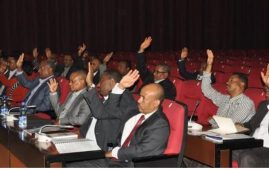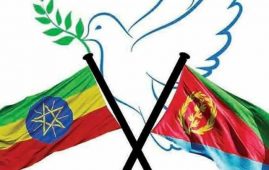Somaliland government ‘have given a month’s notice to an estimated 80,000 illegal immigrants – mostly Ethiopian – to leave the region’, IRIN reported a while ago.
The news quoted Somaliland’s Deputy Minister in the Ministry of Resettlement, Rehabilitation and Reintegration Osman Garad Sofe s saying:
After evaluating the status of the illegal immigrants, we realized that these people have no benefits for the country; on the contrary, they are a problem in terms of security,….For this reason, the government of Somaliland has given a month’s notice to all illegal immigrants to leave the country. Those who do not leave will face legal charges and be deported.
Another Somaliland official reportedly said:
We recognize only 1,772 Ethiopian refugees out of 80,000 to 90,000 illegal immigrants in Somaliland. And the decision will affect those of every nationality living in Somaliland illegally.
The news also quoted a man, who is said to be chairman of the Organization of Ethiopian Refugees in Somaliland, who described the situation as:
Fewer than 2,000 Ethiopians are recognized by Somaliland; most of these arrived in 1991 while others came in the 2000s. In 2006, Somaliland informed UNHCR [UN Refugee Agency] that it did not have the capacity to host any more refugees; for this reason, no asylum seekers are accepted any more in Somaliland. The process of seeking asylum started at the Ministry of Interior and the ministry has already closed its doors to any more refugees. Those who are recognized as refugees have legal cards identifying them as members of our organization.
The news also cited an unnamed official Somaliland’s migration office, who claimed they are working in collaboration with the International Organization for Migration (IOM) to repatriate some 570 Ethiopians. The official added, "Two Ethiopian officials are already here to screen these people to determine whether or not they are Ethiopian".
On the other hand, IRIN indicated UNHCR Somalia had held ‘initial talks with Somaliland authorities to chart a way forward for those targeted by the government’s notice’, citing an officer of the organization. The officer also commented that they expect that ‘any measure authorities took would be in accordance with international humanitarian law as well as national laws.’
Somaliland is a breakaway northern territory of Somalia. Though it declared independence almost two decades ago, it has not achieved international recognition.
Given the Somaliland’s government reliance on Ethiopia for diplomatic and security support, it is unlikely that the decision to deport would be taken without the knowledge, if not consent, of the latter.
It is presumable that security concerns precipitated the move.
The news also reported that the autonomous region Puntland, which is south of Somaliland, ‘initiated a scheme to issue ID cards to internally displaced persons (IDPs) from southern Somalia who have sought refuge in the region. The move, officials said, would weed out militias and other criminal elements from genuine IDPs.’
A Puntland official was quoted as saying that:
The ID cards will be given to all IDPs in Puntland; these people will, in particular, get food distribution cards, those for registration, ID cards to enable WFP [World Food Programme] or other aid organizations to count them…These IDs will also be issued for security matters [because] we want to encourage the IDPs to police themselves… build police stations and recruit some of them to handle their own security.
[Update will provided as more details emerge – esp. on the Somaliland case]






You almost omitted one important point in the news that might help the reader to understand that the Ethiopians in Somaliland are not in Safari. Here is what an Ethiopian lady has to say:
“We are now begging for bus fare so we can return to Ethiopia; the government here will not allow us to continue begging”, said Farah Abdi, an Ethiopian mother of three, who survives by begging in Hargeisa.